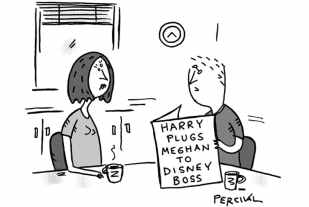More and more of us are staying home for our holidays — but even so, our small hotels and B&Bs are folding at a scary rate. UK hotel insolvencies are up 60 per cent, it was reported last week. Why? Competition bites, said the papers, blaming Airbnb. But there’s another biter, too — more sinister for seeming more helpful.
The majority of hotel bookings are now made on the internet, and most of those via one of the two enormous internet travel companies: Booking Holdings and Expedia. It might seem to you and me, as we click away the January blues, that there’s a swarm of jostling online travel agencies (or OTAs) — Trivago, Kayak, Agoda, Hotels.com, Priceline — but the reality is that almost all of them belong to, or are ‘affiliate partners’ of, Booking Holdings or Expedia. It’s a near duopoly, and these two tentacular monsters, the giant vampire squids of travel, are beginning to suck the life out of the small fry they claim to help. So yes, competition bites — but a chronic lack of competition bites too.
In the beginning, Booking.com (the larger squid) was a force for good. It took just a 5 per cent commission fee on each room and delivered customers who’d never otherwise have come. Then the commission began to rise: 10 per cent, 15 per cent, these days sometimes as much as 20 per cent — and for what? A hotelier in Cornwall explained his predicament to the BBC: ‘I have a small B&B, which I have owned for three years, and have not yet made a profit, due to Booking.com. I’ve had lots of customers book through them — then, if they cancel, Booking.com still takes the commission from me. If a customer leaves early or leaves without paying, they will not pursue the payment on your behalf.’

We’re worth it, insist the OTAs. We earn our slice of the pie: think of the zillions we spend on marketing. But what a very fat slice of the pie it is. They don’t build the hotels, make the beds or cook the breakfast, and yet between them the two vampire squids are worth more than $100 billion. The CEO of Booking Holdings, a Mr Glenn D. Fogel, was paid compensation of around $20,000,000 in 2018.
Where’s Tom Wolfe when you need him? Glenn needs to be fictionalised to be believed. He’s a 21st-century master of the universe: trained as a lawyer, worked as a banker, now coining it courtesy of algorithms. Glenn has to appear to be laid-back — he’s in the leisure industry after all — but he might be the most uptight human I’ve ever seen. There’s a video of him online repeatedly slapping down a very patient interviewer for daring to interrupt a boring story he’s telling about a hotel that mislaid his reservation. Didn’t Booking.com ever let a guest down, asks the interviewer eventually. I thought Glenn might actually hit her. Glenn likes to say: ‘We are a service company. We are nothing without the people — the customers, the supplier partners and the employees.’ But that raises the question: why then do you treat them so shabbily?
Apparently these depressing rooms were in great demand: ‘Nearly sold out!’ ‘Quick! Only one left!’
I first became aware of both the reach and the limitations of Booking.com in 2018 when I was looking for a hotel in London — one night for me and my husband away from the toddler, somewhere nice with no Lego. After six solid hours searching I felt desperate and incredulous. Every room available seemed designed for the short-stay businessman: all strip lighting and laminated desks. Each one was equally depressing, and yet somehow they were in great demand: ‘Ten other people just booked for your dates!’ ‘Nearly sold out!’ ‘Quick! Only one room left!’
It seemed too weird to be true. And it was. Last year, the Competition and Markets Authority clamped down on ‘pressure selling’ by OTAs— that is, giving a false impression of the availability of a hotel or rushing customers into making a booking based on incomplete information.
But they’re still at it, according to David Weston, chairman of the B&B Association. ‘Pressure–selling techniques continue and nor do we believe that OTAs have done enough to explain clearly to consumers how their default search rankings are affected by the payment of commission.’ Aha! Those grisly places at the top of my search list had just paid to be there. Customer service eh?
Even if a wily customer tries to deal with a hotel directly, Mr Weston tells me, the OTAs take their pound of flesh. You might imagine a struggling hotel or B&B could offer their own lower rates to tempt customers. Nope. In both the UK and US, Booking.com can insist on ‘rate parity’ clauses which mean that hotels are actually not allowed to discount their own prices to their own customers on their own websites.
There are other nasties in the small print, too. Booking.com insists on the right to bid on your hotel’s name; to buy Google ads containing that name. So in any search for a particular hotel, the first few options on the list will be Google ads that take you straight back to Booking.com. It’s called ‘brand-jacking’ and thousands of hoteliers have signed a petition to have it banned. Councillor Armand Toms of Cornwall council reckons ‘brandjacking’ by OTAs costs small Cornish businesses £20-£30 million a year.
By chance, I did find a perfect B&B for my night off back then. The Cable Street Inn isn’t signed up to any OTA, but I found it through a newspaper review. Every room’s a beauty and there’s a balcony for breakfast opposite the famous Cable Street mural.
As it happens, you can type in landmarks on Booking Holdings websites, so I searched for what it recommended near the Cable Street mural. The place it thought best was called Shadwell Budget Rooms — a double room in a council block, at £900 a night. And because Booking Holdings has any number of ‘affiliate partners’ who share its inventory, Shadwell Budget Rooms is extremely prominent online. ‘Only one room like this on our site,’ says Booking.com. ‘Lock in this great price today.’







Comments